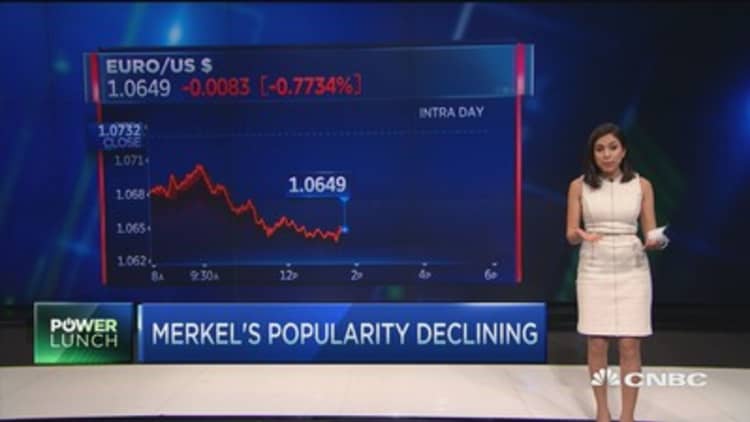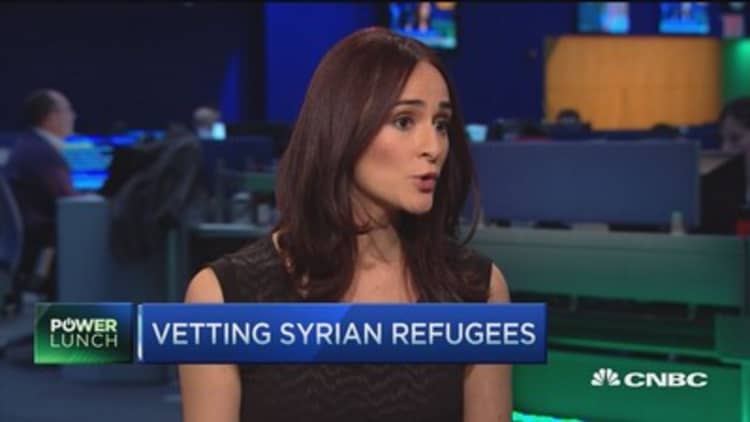
German Chancellor Angela Merkel, who's usually seen as Europe's indispensable leader, is in danger of losing that role.
Merkel has drawn strong criticism for her handling of the continent's refugee crisis, particularly after the mass killings of 130 people in Paris. Those attacks came at a time when Germany, arguably Europe's real center of political power in addition to being its biggest economy, was already seeing its image suffer in Europe and in the United States.
Merkel has been a vocal advocate of admitting refugees from the Middle East and elsewhere into Europe, and has pressured other European nations to do the same. But that influence appears to be slipping.
"It's surprising how fast the pendulum has swung. With Merkel as the queen of Europe — and now, can she finish her term?" Marc Chandler, head of currency strategy at Brown Brothers Harriman, told CNBC shortly after the Nov. 13 attacks.
Citi Research said in a note last week that Merkel's personal popularity in Germany had dropped from 67 percent this summer to 49 percent in November, its lowest point since the euro crisis in 2011. Speculation that Merkel will be forced out or step down has never been more intense than now during her 10-year reign, the firm said.
Tina Fordham, political strategist at Citi, said that without Merkel, questions rise about whether Germany would continue to be the political powerhouse that steers the 28 members of the European Union through its myriad challenges.
Two main challenges
Two major challenges will test Merkel's leadership in coming weeks. One is finding an effective solution to the integration of migrants, while also addressing the recent security concerns. Second is orchestrating a concerted effort against Syria, especially one that enlists Russian and Turkish help. "Vladmir Putin respects Merkel the most, and therefore it is crucial that she leads the West in these discussions with Russia," said Carsten Nickel, senior vice president at Teneo Intelligence.
If Merkel is unable to manage those two scenarios in a way that satisfies her European counterparts and German citizens at home, her popularity could drop even further ahead of national elections in 2017, political experts say.
While her ratings have softened, she remains popular within the party as well as quite respectably with the German public. And most importantly, there is not at present a viable alternative. That is crucial.Tina Fordhampolitical strategist, Citi
A weakened Merkel also complicates Europe's internal politics. She has played a key role in brokering financial compromises with Greece, and with UK Prime Minister David Cameron over that country's potential exit from the EU.
Germany is also in the middle of overseeing an investigation into Volkswagen over automobile emissions; that scandal has dented car sales and hurt the "Made in Germany" brand. Experts aren't blaming Merkel for problems at Volkswagen, but there are questions about whether regulators overlooked emissions concerns at Germany's largest automaker.
'She remains popular'
Despite Merkel's compromised status in Europe, most experts who spoke to CNBC agreed that it's too early to count her out among the Germans.
"She has slightly miscalculated the public response to her refugee policy. I think it takes a lot more than this to make her lose power, but she would do well helping (the German states) with some meaningful support program towards the integration efforts," said Lothar Mentel, chief investment officer at Tatton investments.
While agreeing that her handling of the refugee crisis has hurt her ratings, Fordham of Citi told CNBC that "she remains popular within the party as well as quite respectably with the German public. And most importantly, there is not at present a viable alternative. That is crucial."

Deepening political uncertainty in Germany also doesn't seem to be directly affecting financial markets, but it's certainly not a welcome sign for investors. Merkel has been seen as the "rock of Europe," playing a critical role in containing the continent's crises, including the financial struggles of Greece and other Southern European countries and the potential exit of the U.K. from the EU.
Geoffrey Yu, a strategist at UBS, told CNBC: "Many clients believe such risks are under-priced right now, but it is very difficult to price. If there are clear warning signals up ahead we would expect options markets to move, but this isn't apparent yet."



